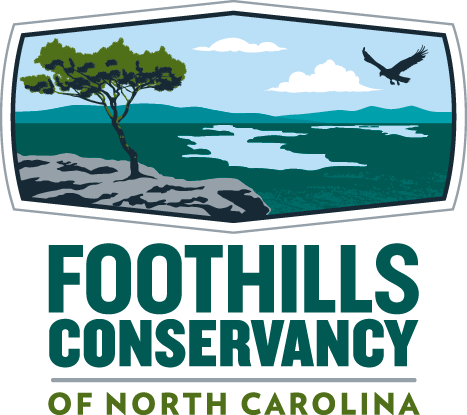Op-Ed: Park to have lasting impact on future generations
What if we had more outdoor spaces readily available to all people — places where we can find common ground, experience fellowship, interact with nature and with others, and make our shared existence more positive?
For more than a year, Foothills Conservancy of North Carolina has been raising funds to purchase a 651-acre property in the Oak Hill area of Burke County, just minutes from downtown Morganton. We call the project the Oak Hill Community Park and Forest. There are no rare or endangered plants or animals found within this property. Historically, the forests here have not been managed very well, and wildlife habitat within is not incredibly diverse. It doesn’t adjoin a national forest or a state park. While the land itself is beautiful, it’s not particularly visible from a highly traveled roadway or a scenic byway. On top of all that, the main creek that flows through the property is an “impaired waterway,” meaning some form of pollution (in this case, sediment) is impacting the stream.
Despite the fact that this property isn’t the most ecologically significant landscape in our service area, right now, it is a major priority for our land trust — and, soon, we hope to permanently protect it. Why? We believe everyone deserves to live in a healthy community and enjoy a connection with nature.
Recently, the conservancy was awarded a $464,000 grant from the USFS Community Forest Program for the Oak Hill Community Park and Forest project. Combining this grant with secured funds from two state conservation programs, several foundation grants, and financial pledges and gifts from many private individuals in the community, we are now about $400,000 away from acquiring a unique landscape that our land trust envisions will become a public asset for all to enjoy.
In establishing the Community Forest Program, U.S. Congress cited rapid development of private forest lands across the nation, declining public access supporting outdoor recreational opportunities, rising obesity rates linked to decreased outdoor recreation, the essential role of forest land in protecting public water supplies, and the importance of forest management demonstration opportunities, among other reasons. The CFP provides authority for the Secretary of Agriculture to award grants for acquiring private forest land threatened by conversion to non-forest uses in order to provide communities with economic benefits, environmental benefits, educational benefits, forest management demonstration benefits and recreational benefits.
Community conservation is somewhat of a new approach that land trusts throughout the country are taking to protect open spaces. What makes this approach different is that it is intended to include and make a positive impact on more people.
Although there is a wide range of community conservation projects, they have many goals in common: connecting people with place, connecting people with people, creating opportunities for people to get involved, energizing the community, providing some form of public access to natural spaces, and providing a lasting and meaningful impact to their surrounding communities.
Foothills Conservancy’s vision for the Oak Hill Community Park & Forest touches on each of these purposes. We want the property to be a safe, welcome place that is easy and free for people to access so they may enjoy the outdoors and connect with others. To achieve this, we hope to develop hiking and mountain biking trails, parking areas and trailheads on the land in the coming years.
We want children and adults to learn about environmental stewardship and the benefits of conserving land and water resources. To do this, we envision developing interpretive programs and partnering with Burke County Public Schools so local students can learn about natural sciences in a more hands-on way.
We want the public and forest landowners to see good forest management practices and teach us about the activities they are using to improve the health of our region’s forests. To this end, we have already begun a forest restoration project on part of the property, planting 3,500 Shortleaf pine seedlings (a native species in decline) on 10 acres that were clear cut before the conservancy had a contract to purchase the land.
The fertile, open meadows of the property provide the perfect canvas for a community agriculture program that connects diverse people to agricultural lands they may otherwise not have access to. Other areas of the property could hold remnants of past cultures, and we are already exploring a partnership with Warren Wilson College and the Exploring Joara Foundation to develop a public archeological program.
Although Canoe Creek, the main waterway on the property, is impaired, this single land acquisition will protect nearly 22 percent of its entire watershed. Even for impaired waterways, protecting undeveloped lands within their watersheds is an important part of ensuring that streams like Canoe Creek, which empties directly into the Catawba River at Freedom High School’s football field, is not subjected to land practices that further pollute our public waterways. After all, we all drink, work and play downstream.
Community can mean a few different things, with definitions varying slightly depending on who you ask. One source defined it as a group of people living in the same place or having a particular characteristic in common. Another describes community as a feeling of fellowship with others, resulting from shared common attitudes, interests and goals. In biology, community refers to the assemblage of interacting organisms coexisting in a particular area and time. The exact wording may change a bit, but each definition shares a common thread: fellowship, interacting, coexisting.
We believe parks, with their innate ability to bring people together in one place, provide the glue that holds a community together.
Can the Oak Hill Community Park & Forest really benefit our community? Can it have a lasting impact on future generations when we’re long gone? We believe so.
Andrew Kota
Executive Director


